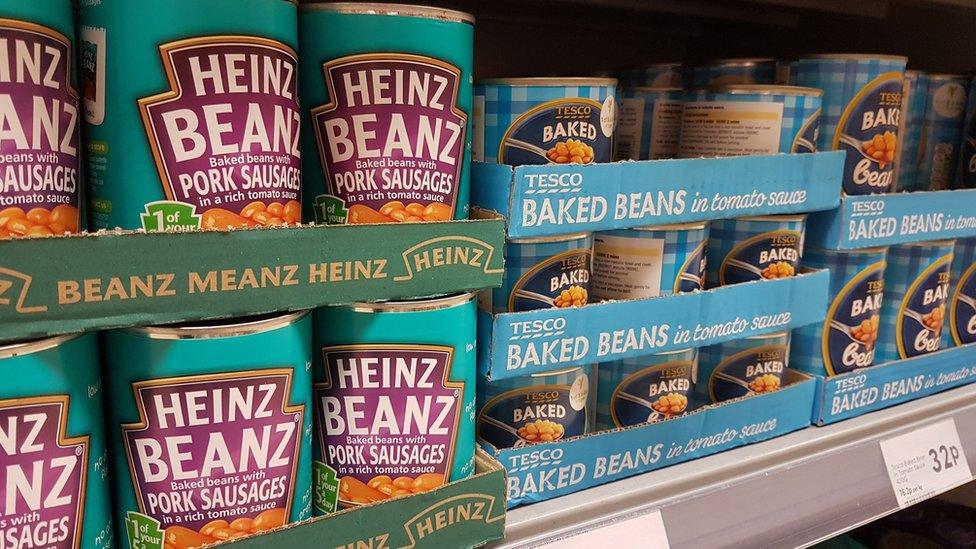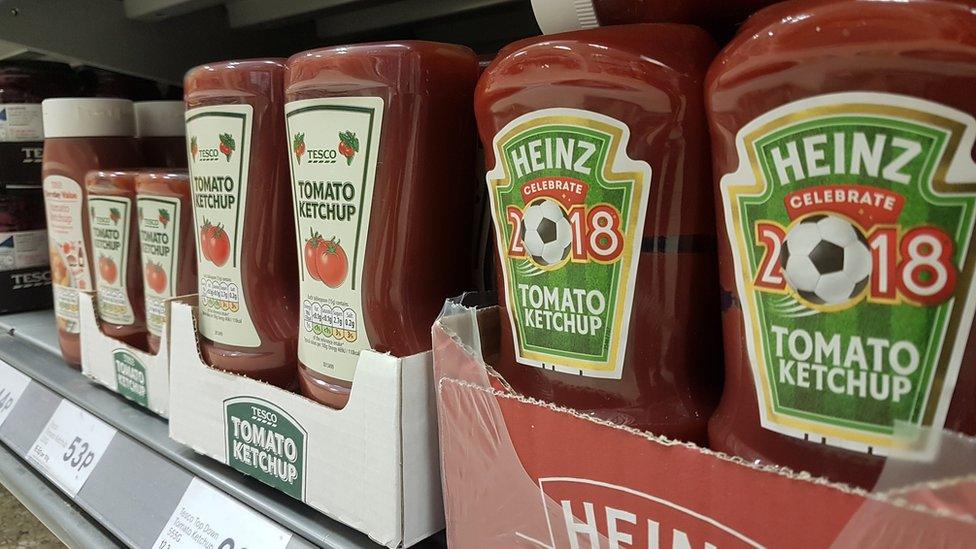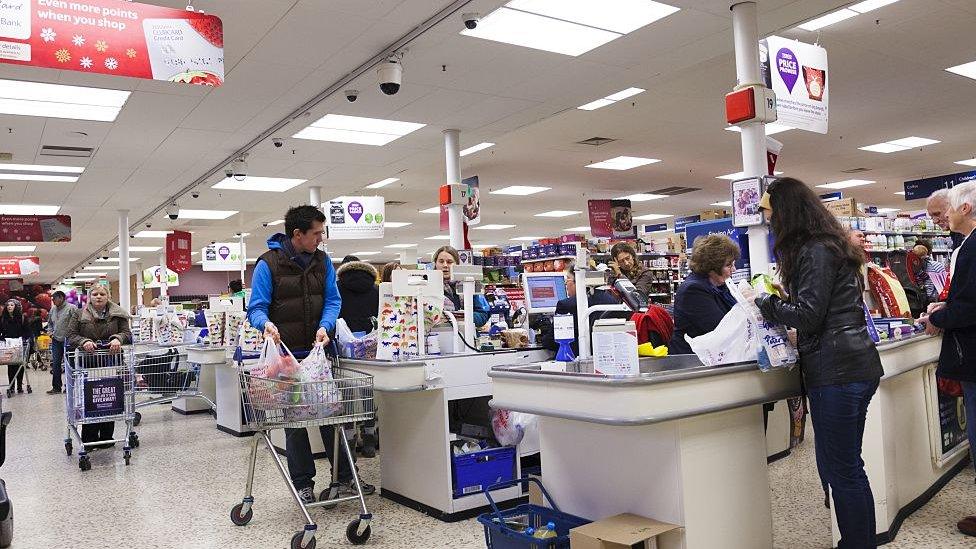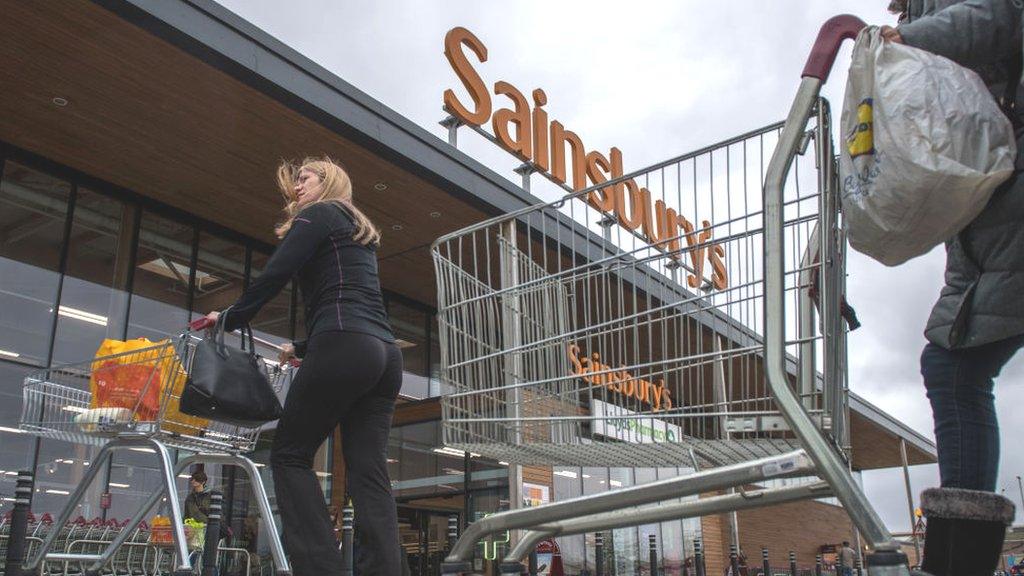How UK shoppers fell in love with own-label groceries
- Published
- comments

Own-label products: more than a row of beans?
"I prefer to buy own-label," says Atusa Salimi, 31, walking out of her local Tesco with a bag of shopping. "It's the price."
Although in all honesty, when it comes to something like a tin of tomatoes, she can't tell the difference, she says.
Atusa, a data analyst in London, speaks for a lot of us, it seems. The supermarkets like Tesco's have spotted that we're buying more products sold under the supermarket's own name, and fewer made by outside brands. And they are planning to capitalise on our changing habits.
"The only thing I wouldn't buy own-brand is cola," adds Atusa. Even with ketchup, she's not bothered about famous names or recipes.
In a nearby aisle, Jennifer, a mother of four, is less sure.
For herself, she'd buy everything own-label, but the kids want certain brands of biscuits and her five-year-old won't eat Tesco baked beans.
While that might sound quite ordinary, in fact, there is a "retail revolution" under way when it comes to private-label products, according to market analysis firm Nielsen. And it's one that could present quite a challenge for the likes of Nestle and Uniliever, which manage many of the world's leading consumer brands.
Rather than just being a row of budget beans huddled on the bottom shelf, own-label lines are now often heavily promoted and are carefully targeted at a range of different shoppers, budgets and market segments.

Atusa buys own-brand on price
Supermarkets are offering everything from a cheaper version of your favourite breakfast cereal to after-dinner chocolates, with the emphasis on the in-house branding, such as Taste the Difference, Luxury, Finest or The Best, rather than the shop's name.
So for Simon Ironmonger, 38, an engineer, who has just picked up his regular lunch - a bottle of oak-aged cider and some cured meat - it's perhaps not surprising that he didn't even notice whether it was Tesco own-brand or not. The supermarket's name is in tiny letters and the type of meat, Bresaola, in large ornate script.
He's sure he picks up more own-brand products, simply because shops are promoting them more heavily.
Tesco has just joined a host of other retailers planning to make more room on its shelves for own-branded products after it ties up with French supermarket giant Carrefour. And the UK chain is already in the process of overhauling every single one of its 10,000 own-label lines.

According to retail expert Patrick O'Brien, all the big grocers are paying close attention to the own-brand market. And Morrisons has managed to turn its fortunes round largely on the back of improving its own-label range.
John Lewis, too, though not a supermarket, also says it plans to increase its own label range to make up half of all the products it sells, following a recent downturn in business.
Mr O'Brien says it is recent pressure on household budgets that's responsible for shaking loose our loyalty to the big brands. But it's also thanks to the arrival of budget supermarkets.
"Aldi and Lidl's success is built on the appeal of own-brand," says Mr O'Brien. It's not just that they're cheap, they've pushed the idea that they can compete on quality too."
In Aldi and Lidl, the brand names you see are carefully crafted in-house lines such as Harvest Morn cereals, Moser chocolate, Birchwood meats and Towergate biscuits, many boasting more than a passing resemblance to popular independent brands.
"Own brand margins are better than branded for retailers because you have vertical control," says Mr O'Brien. But keeping it in-house also means the chance to respond to local preferences, new trends such as environmental concerns or fashions.

While supermarkets are eager to make the most of the opportunity to manage marketing, prices, and the entire supply chain, wherever they can, they won't be in a position to ditch brands altogether, suggests David Sables, chief executive of Sentinel, a firm that advises suppliers on negotiations with supermarkets.
A lot of brands still have a deep connection with their customers, he argues.
"Heinz tomato ketchup - they've advertised, they've got a formula that works. If you say, 'I'm going to kick you out,' everyone knows that's probably not true.
"When [a brand has] a good connection with the consumer, however much the retailer huffs and puffs, they'd be cutting off their nose to spite their face if they discontinued that product."
- Published29 June 2018

- Published30 April 2018
